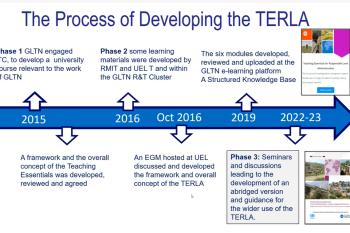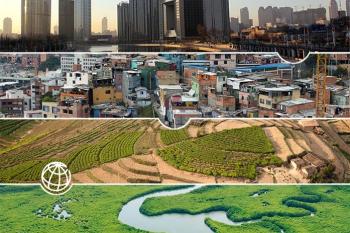
UN-Habitat and the Government of DR Congo Mark Milestone in Land Reforms with handover of Inongo Land Administration Building
27-28 September 2025—A significant milestone in the Democratic Republic of Congo's land reform journey was marked as UN-Habitat officially handed over a newly constructed land administration building to the Government of the DRC in the Territory of Inongo, Mai Ndombe Province. The inauguration ceremony brought together key stakeholders, including the Minister of Land Affairs, the Governor of Mai Ndombe, the UN-Habitat Country Director, and various government officials, all of whom emphasized the transformative impact this infrastructure will have on local communities.
The Conservator of Land Titles expressed gratitude for the new facility, stating that the new building would significantly improve working conditions and enhance the administration's capacity to address the land tenure security needs of local communities. "This building represents more than just infrastructure, it represents our commitment to serving our people better," officials noted during the ceremony.
The building also represents a strategic investment in land reform, being the second building developed under the land reform program. The Secretary General of Land Affairs hailed the construction of this building, noting that several state services rent private buildings. He highlighted the need to capacitate state agencies, as this would help improve governance and management. Showing stakeholder buy-in, the Governor of Mai Ndombe commended the quality and speed of construction and pledged to ensure proper maintenance of the facility while calling for similar infrastructure support in other territories of the province where government buildings are deteriorating.
Addressing Conflict Through Grassroots Dialogue
On the second day of the mission, UN-Habitat facilitated a crucial working session with civil society organizations in Mai Ndombe to address land and customary conflicts in Kwamouth territory and explore pathways to reduce tensions.
The discussions highlighted the importance of organizing community dialogues to strengthen rapprochement between conflicting groups and plan for peaceful coexistence. Additionally, it was agreed that analysing the crisis’ effects on housing and the overall environment, would help in planning for the return of Internally Displaced People to their homes. Finally, the working session agreed that it is important to establish clear modalities on how the community can interact with public institutions to help in the alleviation of conflict.
Looking Ahead
The handover of the land administration building and the collaborative discussions on conflict resolution demonstrate the power of partnership between international organizations, government, and civil society in building sustainable peace and improving governance in the DRC. Looking ahead, the UN-Habitat Country Director announced UN-Habitat's plans to strengthen its presence in Mai Ndombe through a new project financed by the United Nations Peacebuilding Fund, specifically targeting the reduction of land and customary conflicts.
In closing, the Minister of Land Affairs stated that this building represented the vision of the Head of State and the overall government to provide quality services to the people. She stressed the ministry's commitment to redouble efforts to ensure achievement of the key milestones of the land reform program, namely, the land law, the national land plan and the legal review, and called on the agents and executives of the land administration to show themselves worthy and live up to the trust of the nation.


